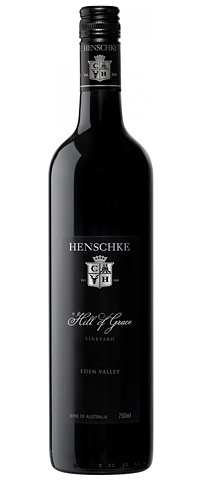
Henschke Hill of Grace
A fabulous offering from cult producer Henschke. From one of the great Australian producers and one which easily rivals in quality that other New World icon, Penfolds Grange, the Hill of Grace is huge scorer year after year and a prestigious wine to secure for the collection.
In Parker’s words: “no Australian wines are richer than these offerings from Henschke”. The Langton’s Classification – the benchmark of Australian fine wine – concurs, rating it as “exceptional” and saying simply: “Henschke Hill of Grace Shiraz is Australia’s greatest single vineyard wine.” James Suckling calls this “the Eden Valley equivalent of Burgundy’s Le Chambertin”.
First released in 1958, but the vineyards were worked by four generations of the Henschke family before that, these gnarled old vines – some of which are pre-phylloxera – are grown without irrigation using organic and biodynamic principles. This wine is not to be missed in any year, but from Wine Advocate’s highest-ever rated vintage for South Australia, it is a must-have.
The South Australian shiraz vies with (the slightly more expensive) Penfold’s Grange Hermitage for the title of our most prestigious wine. Henschke would like to catch up but is not there yet. Its price growth in the past 30 years has been exponential.
Unlike Grange, which is a blended wine from different vineyards and districts, Hill of Grace comes from just one place. The family-owned vineyard in the Eden Valley lies opposite a beautiful old Lutheran church, named after a picturesque region in Silesia called Gnadenberg, which means hill of grace.
When the vines were planted, Abraham Lincoln was the US president. The first vintage was made in 1958 by Stephen’s father Cyril Henschke. His initials still adorn the Henschke crest on all its wine labels. “I don’t have a big enough ego to change it,” Henschke confides over dinner.
This is a wine with concentration, structure, and generosity. There are chocolate and cherry notes, spices, florals, vanilla bean, dark coffee, dark fruits, and even the merest hint of a nicely charred steak to be found on the nose. Good power, plenty of tannins, but they are micro-fine and silky. A supple texture and incredible length: it just goes on and on.
As good as it is now, this is a wine with potentially 40 years plus ahead of it. If one wants a score, 98+. And even that seems a little stingy.
Henschke Hill of Grace
To see our Henschke range go to https://www.auswinesonline.co.uk/product-category/henschke/
For more information on Henschke go to https://www.henschke.com.au/store/
£599.00 a bottle
2 in stock
“The Henschke family is one of the longest-established wine names in the Barossa. Johann Christian Henschke purchased land for a farm at Keyneton in 1861 and planted a small vineyard and orchard, and produced his first commercial vintage in 1868. His son, Paul Gotthard, continued farming and winemaking and planted more vines to increase wine production. Upon his father’s death in 1914, third-generation Paul Alfred took over the property and as demand for fortified wines grew, winemaking assumed greater significance. Each generation built upon the reputation for quality, but it was fourth-generation Cyril Alfred Henschke who in 1958 created the wine that has most captured the red wine world’s imagination – Hill of Grace. His first vintage of this Shiraz was produced in 1958.
Today, fifth-generation Stephen Henschke and his wife Prue uphold the family name and reputation, as winemaker and viticulturist respectively. The original two-storey cellar, built into the side of the hill in time for the 1868 vintage, has been added to throughout the generations. Now covered with ivy, the stone building retains an old-world charm with its open fermenters and winemaking memorabilia on display.”
The Eden Valley is between 400 and 600 metres in the Barossa Range, part of the Mount Lofty Range. It shares it historical roots with the Barossa Valley. Yalumba has substantial vineyard holdings, and a winery at Angaston, the site of the first vines planted by founder Samuel Smith in 1849. The cool climate provides ideal conditions for the production of high quality Riesling, Chardonnay and Shiraz wine.
flourish in a range of climates. In the warm to hot climates you can expect extremely intense aromatic, rich, full bodied wines, with hugh fruit (almost sweet) and chocolately tasting. In the more moderate/cooler climates you’re more likely to find structured Shiraz wines with black cherry, pepper and spice characters rather than the chocolate and fruit styles found in warmer climates.
This website uses Cookies to improve your browsing experience. View Cookies Policy
I'm fine with this